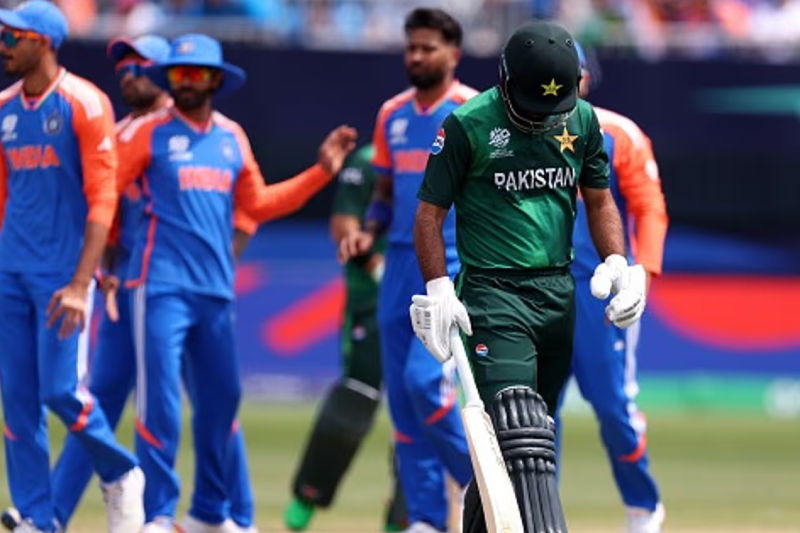The Asia Cup 2025 controversy between Pakistan and India has escalated further as the Pakistan Cricket Board (PCB) has lodged a formal complaint with the International Cricket Council (ICC) over Fakhar Zaman’s disputed dismissal during Sunday’s Super Four clash. This marks the second official complaint Pakistan has filed against match officials during the tournament, highlighting the growing tensions surrounding umpiring decisions in cricket’s fiercest rivalry.
Formal Complaint Against Third Umpire Filed
The Pakistan Cricket Board (PCB) have lodged a formal complaint with the ICC against Ruchira Palliyaguruge, who was the TV umpire during the India-Pakistan match at the Dubai International Stadium on September 21. The complaint specifically targets the controversial decision-making process that led to Fakhar Zaman’s dismissal.
Pakistan team management have lodged a complaint against the television umpire with the International Cricket Council (ICC) over a caught-behind dispute involving Fakhar Zaman in Sunday’s Asia Cup Super Four match against India in Dubai. This represents an unprecedented escalation in Pakistan’s protest against officiating standards during the tournament.
Controversial Dismissal Details
The controversy erupted in the third over of Pakistan’s innings when Fakhar Zaman was given out caught behind off Hardik Pandya’s bowling. The ball flew directly toward the Indian wicketkeeper Sanju Samson, who dived and caught it just above the ground at the Dubai International Cricket Stadium. The catch looked extremely close to the turf, forcing the on-field umpires to refer it to the third umpire, Ruchira Palliyaguruge.
The ball was a bit slower from Hardik and it was clearly dipping as it found the wicketkeeper’s gloves. The umpires called for the intervention of 3rd umpire, who judged the batter out. Fakhar, who was batting on 15 off just 8 balls, was visibly distraught and was livid with the decision.
The timing of the dismissal proved particularly crucial as Fakhar had been looking in excellent form, having scored 15 runs from just 8 balls with three boundaries, suggesting he was settling into his innings effectively.
Player and Management Reaction
After watching it carefully on the big screen, the third umpire ruled the batter dismissed. As the big screen displayed the final decision loud and clear, Zaman walked back while shaking his head. Pakistan head coach Mike Hesson was also looking unsatisfied with the decision.
The visible frustration from both player and coaching staff indicated immediate disagreement with the third umpire’s interpretation of the available footage. Fakhar’s animated reaction as he walked back to the pavilion became one of the defining images of the controversial encounter.
Expert Criticism and Analysis
Former Pakistan legends have voiced strong criticism of the decision-making process. Cricket experts and former players have questioned whether the available technology provided sufficient evidence to overturn the on-field decision, particularly given the inconclusive nature of the replay footage.
The controversy has reignited debates about the reliability of current Decision Review System (DRS) technology and the standards required for third umpires to make definitive calls in crucial match situations.
Pattern of Officiating Disputes
This complaint represents the second time during Asia Cup 2025 that Pakistan has formally challenged match officiating. Their earlier protest concerned match referee Andy Pycroft’s handling of the handshake controversy from their first encounter with India, establishing a pattern of escalating disputes with tournament officials.
The accumulation of officiating complaints suggests deeper concerns within Pakistan cricket about the standards and consistency of decision-making in high-stakes encounters, particularly against traditional rivals.
Social Media and Fan Reaction
The dismissal sparked immediate controversy across social media platforms, with cricket fans and experts divided over the decision’s correctness. Pakistani supporters expressed outrage over what they perceived as another questionable call against their team, while the incident became one of the most debated moments of the tournament.
The viral nature of the controversy demonstrates how individual umpiring decisions can significantly impact public perception of tournament integrity and fairness.
ICC’s Challenge in Managing Disputes
The ICC now faces the challenging task of reviewing multiple complaints from Pakistan while maintaining tournament credibility and competitive integrity. The world cricket body must balance Pakistan’s legitimate concerns with the need to support its appointed match officials.
The frequency and intensity of Pakistan’s complaints create administrative pressure on the ICC to provide transparent explanations for controversial decisions while ensuring consistent officiating standards throughout the remainder of the tournament.
Impact on Tournament Atmosphere
The ongoing disputes over officiating have fundamentally altered the Asia Cup 2025’s atmosphere, with administrative controversies overshadowing on-field competition. Each match involving Pakistan now carries additional scrutiny regarding umpiring decisions and their potential impact on results.
Technology and Decision-Making Standards
The Fakhar Zaman dismissal controversy raises important questions about DRS technology limitations and the thresholds required for overturning on-field decisions. The incident highlights ongoing challenges in achieving definitive conclusions from available footage in borderline situations.
Cricket’s governing bodies may need to reassess current protocols for third umpire decision-making, particularly in high-pressure encounters where marginal calls can significantly influence match outcomes.
Also read this: South Africa Cricket Star Back in Action vs Pakistan
Looking Forward: Tournament Implications
With potential further encounters between Pakistan and India still possible in the tournament’s later stages, resolving these officiating disputes becomes crucial for maintaining competitive integrity. The ICC’s handling of Pakistan’s complaints will likely influence future protocols for managing similar controversies.
The outcome of these formal complaints could establish important precedents for how cricket’s governing bodies address disputed officiating decisions in major tournaments, particularly in politically sensitive encounters that attract global attention and scrutiny.

